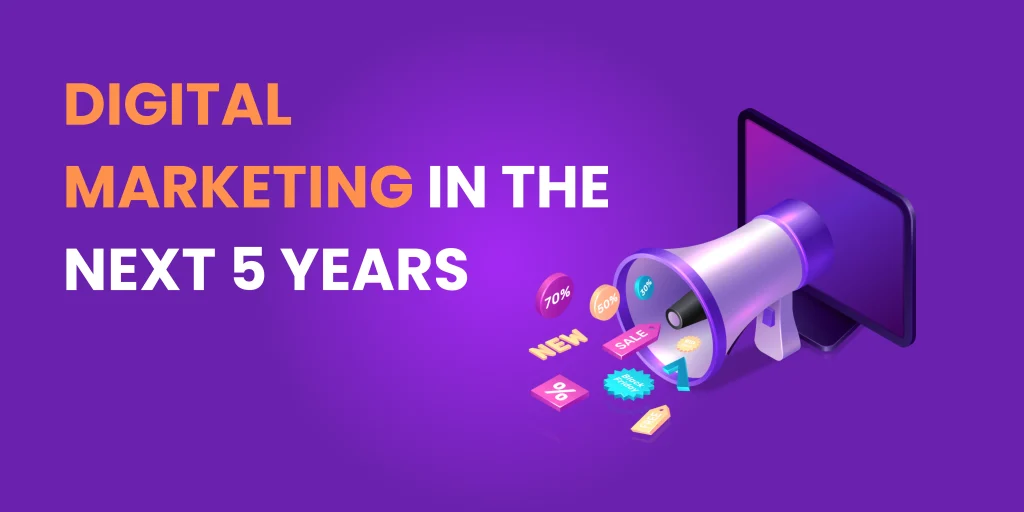
Digital marketing is always progressing due to changes in consumer behavior and new technology. During the next five years, we expect some transformative innovations that will likely change our approach towards digital marketing. As a best freelance digital marketer in Calicut, I need to keep them updated so that I can be ahead to provide improved services for my clients. Here are some significant changes that we can expect in digital marketing.
1- AI-powered Marketing
digital marketing is constantly and rapidly changing thus enabling more personalized customer engagements. In the coming years, technologies will change further allowing marketers to analyze data as it happens and instantly forecast their behaviors. This will enable campaigns to be optimized faster and also provide very relevant content. Automation should be able to handle repetitive tasks such as ad targeting or email personalization so that marketers can focus on strategies and creativity.
Additionally, chatbots are expected to spread more widely to enhance engagement with websites and social media as well as improve customer support. These chatbots shall deliver instant responses thereby enhancing better interactions over time hence providing improved services.
2- Voice Search Optimization
The popular use of voice assistants and smart speakers like Alexa, Siri, and Google Assistant explains why voice search is growing fast. It’s expected that by 2024, over half of all searches will be done by voice. Therefore, marketers must begin preparing their materials to answer queries posed verbally since spoken questions usually come with differing formats or intentions from regular worded inquiries.
To optimize voice search for search engines, you need to use conversational SEO techniques and understand how natural language processing (NLP) works. This involves the use of long-tail keywords as well as providing direct answers to commonly asked questions. By adapting successful voice search brands, brands can increase awareness about their products to customers who want a hands-free experience.
3- Dominance of Video Marketing
Video content on digital platforms still reigns supreme and has a unique pull to its users that demands interaction like never before. Live streaming and interactive video formats are useful in engaging users in real-time and building a community; short-form videos on TikTok and Instagram Reels are perfect for catching the attention of teenagers.
In the following five years, we can expect brands to invest more in shooting videos to narrate their messages effectively. Video marketing aids not only in emotional connections with the audience but also improves SEO as search engine algorithms love videos. Marketers will have to test different forms of video and distribution strategies to stay relevant and engaging in an increasingly competitive digital marketplace.
4- Privacy & Data Protection
There is an increasing trend towards strict global data privacy laws (such as CCPA in California or GDPR in Europe) which make people more aware of how corporations collect, store, and use personal data. Following and transparency must be priorities for marketers who want to establish and maintain customer trust when it comes to their data operations.
There will be an increasing popularity of techniques such as zero-party data gathering which involves users offering their information willingly to get experiences that are personalized. Marketers will need to tell customers about the benefits of data exchange to secure sensitive information and also put strong security measures in place. As a result, consumers have come to Understand brands that handle data ethically and have transparent privacy policies as having a competitive edge over their competitors.
5- Augmented Reality and Virtual Reality
Virtual reality (VR) and augmented reality (AR) are rapidly transforming digital marketing by creating engaging experiences that blend real and virtual elements in interesting ways. The fact that was made to be surprising is now evident through the recent trends in online retailing through augmented reality (AR) shops which allows a customer to have a chance to look at any commodity of interest directly from their sitting room amongst other places. Similarly, VR has been adopted for creating memorable brand experiences through interactive stories, virtual events, and product demonstrations.
Moreover, AR and VR technologies will find usage for marketing purposes across various industries apart from retail where they are widely available and affordable. This includes real estate, tourism, education, and other areas. To do this marketers require going beyond the box to engage customers with their business standing out among a crowd of competitors at marketplaces.
6- Sustainability and Corporate Social Responsibility (CSR)
When buying products, consumers nowadays consider sustainability and corporate social responsibility (CSR) more important. This also helps them build brand loyalty and reputation while drawing in environmentally and socially conscious customers.
The next five years will be characterized by digital marketing that reflects the trend toward sustainability with community involvement, transparent supply chains, eco-friendly practices, and methods being emphasized most. Authenticity will become very important in marketing campaigns as well as company operations because customers expect firms to walk the talk rather than just talk about them.
7- Influencer Marketing Evolution
The scope of influencer marketing is growing beyond celebrities to involve micro-influencers and nano-influencers. Smaller audiences belonging to the latter however are more active in participating which makes it easier for them to influence the purchase of goods among their followers compared to usual stars who seem too far from their fans to be trusted.
Maintaining influencer relationships, assessing engagement levels, and calculating return on investment will require artificial intelligence (AI) – powered solutions. Marketers have to partner with influencers that are highly compatible with their brands and desired customers by having the same brand values as them.
8- Content Interactive Experiences
Interactive graphics, pools, and quizzes are becoming more and more popular since they can increase user engagement and provide insight into the audience of the company. By contrast with passive information, interactive forms bring consumers into the process which makes them more memorable and shareable through social media.
Marketers will keep experimenting with gamification and interactive storytelling strategies in search of immersive brand experiences that can connect businesses with their consumers in the next five years. Through participating in a brand story, such interactive content experiences help to strengthen ties between a company owner and customers while at the same time entertaining or teaching them.
Conclusion
Looking into the future of digital marketing, companies must adopt these emerging trends if they are to keep ahead and tap into the technological generations of today. The ever-changing digital space calls upon brands to utilize AI for personalized experiences; optimize for voice search; embrace interactive and video content; prioritize data privacy; adopt AR/VR technology; show CSR values; change influencer strategies and produce engaging interactive experiences.
Make sure you stay tuned as we go deeper into each trend, offer practical advice, and tactics that will help you succeed in the changing face of digital marketing. In a bid to grow in the digital age, one has to give room for innovation, remain flexible, and never stop delivering value to your audience.
